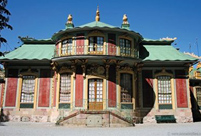 Vintage cars show kicks off in London
Vintage cars show kicks off in London
 Gorgeous scenery in NE China
Gorgeous scenery in NE China
 Picturesque Barkol grassland in Xinjiang
Picturesque Barkol grassland in Xinjiang
 Small Wild Goose Pagoda - A World Cultural Heritage Site along the Silk Road
Small Wild Goose Pagoda - A World Cultural Heritage Site along the Silk Road
 Maritime Silk Road Luxuries of the Han Dynasty
Maritime Silk Road Luxuries of the Han Dynasty
 Ciao! Chinese beauties!
Ciao! Chinese beauties!
 An eye feast: BFA freshmen registration
An eye feast: BFA freshmen registration
 Top 10 most lavish weddings
Top 10 most lavish weddings
 Most amazing chi-pao beauties
Most amazing chi-pao beauties
 Chinese lingerie brand arrives in Las Vegas
Chinese lingerie brand arrives in Las Vegas
Jo Winfield, the head of education and training at the British Horse Society, says it has been working with Hong Kong riding schools for many years but this year the Beijing riding school Equuleus International Riding Club has become BHS's first approved school on the Chinese mainland.
Winfield and her team are helping Equuleus design a curriculum and run the courses.
The courses are still entry level but she says she expects more advanced courses will eventually be available in China.
Many international equine industry programs, such as those by Darley, a thoroughbred horse racing operation controlled by Sheikh Mohammed bin Rashid Al Maktoum, ruler of Dubai, now welcome Chinese students.
In 2012, Darley opened the Dubai International Thoroughbred Internships program, which teaches students about thoroughbred racing and breeding, and the aim is to recruit graduates from China's top universities.
"As the Chinese thoroughbred industry is at an early stage of development, we have decided to support China by helping their people develop the skills needed to form a foundation for the future of the industry," says James Hall, director of Darley China.
"We hope the interns will become ambassadors for the Chinese thoroughbred industry," Hall says, adding that by next June more than 60 Chinese students will have graduated from the program.
Apart from the most obvious opportunities like horse exports and training support, many other players in the British equine industry are seeking opportunities in China, including riding gear, supply equipment, and equestrian facility construction, Williams says.
She initially started to look into the Chinese market in 2010 by visiting a weeklong equestrian festival in Chengdu.
In 2012 she took a delegation of British companies to the China Horse Fair in Beijing to promote their products. The delegation attracted great interest and Williams has been organizing the trip every year since then.
The delegation consists of companies involved in various aspects of the equine industry, including riding equipment, horse supplements, saddles and infrastructure such as riding surfaces.
Last year the delegation also hosted a reception at Johnny Walker House, an ultra-luxury boutique in Beijing, in cooperation with the Beijing Equestrian Association. It also organized a day visit to some of the riding establishments in Beijing to gain a better understanding of the Chinese market, Williams says.
Although the UK has a big equine market, exports are still important for many British companies because the size of the British domestic market is vulnerable to uncontrollable factors such as disease or weather, she says.
The UK market was hit by foot and mouth disease in 2001 and a year of awful weather in 2012.
"A lot of UK companies are looking at exports because they cannot put their eggs in one basket," Williams says.
Traditionally British equine industry companies have exported heavily to Germany, North America and Australasia, but they are now looking at emerging economies such as Turkey and China.
 |  |
 Appreciating red leaves in early autumn
Appreciating red leaves in early autumn Apple introduces larger iPhones, new watch
Apple introduces larger iPhones, new watch Chinese Buddhist Canon blesses Hong Kong
Chinese Buddhist Canon blesses Hong Kong Beautiful postgraduate teaches in remote area
Beautiful postgraduate teaches in remote area Amazing Guinness World Records
Amazing Guinness World Records Freshmen of Beijing Dance Academy take military training
Freshmen of Beijing Dance Academy take military training Chinoiserie architectures overseas
Chinoiserie architectures overseas Top 10 world's highest-paid models 2014
Top 10 world's highest-paid models 2014 Following the step of Zheng He
Following the step of Zheng He Childhood on grassland
Childhood on grassland Traditional Zhou dynasty style proposal
Traditional Zhou dynasty style proposal Tibetan students embrace new semester
Tibetan students embrace new semester Peace Mission 2014 joint military drill
Peace Mission 2014 joint military drill Sand painting world
Sand painting world Mind-boggling building looks like 'house of cards'
Mind-boggling building looks like 'house of cards'Day|Week|Month